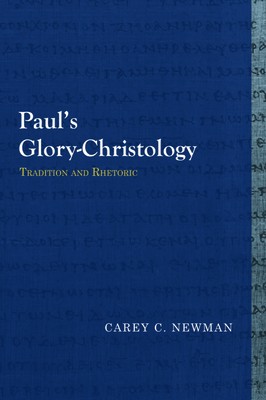
- We will send in 10–14 business days.
- Author: Carey C Newman
- Publisher: Baylor University Press
- ISBN-10: 1481307967
- ISBN-13: 9781481307963
- Format: 15.2 x 22.9 x 1.9 cm, softcover
- Language: English
- SAVE -10% with code: EXTRA
Reviews
Description
Glory formed an essential part of early Christianity's christological vocabulary. Along with "word," "image," and "wisdom," Glory ( doxa) language worked to define the identity, status, and even uniqueness of Christian belief in Jesus.
In Paul's Glory-Christology author Carey C. Newman, using methodology developed in semantics, semiotics, and literary theory, examines the origin and rhetoric of Paul's Glory-language. Newman divides the investigation into three distinct tasks: (1) to plot the tradition-history of Glory that formed part of Paul's linguistic world, (2) to examine Paul's letters, in light of the reconstructed tradition-history of Glory, in order to discern the rationale of Paul's identification of Christ as Glory, and (3) to map out the implications of such an identification for Paul's theological and rhetorical strategy. Newman reaches four conclusions for understanding Paul. First, Paul inherited a symbolic universe with signs already full of signification. Second, awareness of the connotative range of a surface symbol aids in discerning Paul's precise contingent strategy. Third, knowing a symbol's referential power defines and contributes to the deeper structure of Paul's theological grammar. Finally, the heuristic power within the construals of the Glory tradition coalesce in Paul's Christophany and thus provide coherence at the deepest level of Paul's Christology. Taken together, these conclusions reveal that nothing less than Paul's declaration of Jesus as God is expressed in his designation of Jesus as Glory.EXTRA 10 % discount with code: EXTRA
The promotion ends in 18d.00:47:56
The discount code is valid when purchasing from 10 €. Discounts do not stack.
- Author: Carey C Newman
- Publisher: Baylor University Press
- ISBN-10: 1481307967
- ISBN-13: 9781481307963
- Format: 15.2 x 22.9 x 1.9 cm, softcover
- Language: English English
Glory formed an essential part of early Christianity's christological vocabulary. Along with "word," "image," and "wisdom," Glory ( doxa) language worked to define the identity, status, and even uniqueness of Christian belief in Jesus.
In Paul's Glory-Christology author Carey C. Newman, using methodology developed in semantics, semiotics, and literary theory, examines the origin and rhetoric of Paul's Glory-language. Newman divides the investigation into three distinct tasks: (1) to plot the tradition-history of Glory that formed part of Paul's linguistic world, (2) to examine Paul's letters, in light of the reconstructed tradition-history of Glory, in order to discern the rationale of Paul's identification of Christ as Glory, and (3) to map out the implications of such an identification for Paul's theological and rhetorical strategy. Newman reaches four conclusions for understanding Paul. First, Paul inherited a symbolic universe with signs already full of signification. Second, awareness of the connotative range of a surface symbol aids in discerning Paul's precise contingent strategy. Third, knowing a symbol's referential power defines and contributes to the deeper structure of Paul's theological grammar. Finally, the heuristic power within the construals of the Glory tradition coalesce in Paul's Christophany and thus provide coherence at the deepest level of Paul's Christology. Taken together, these conclusions reveal that nothing less than Paul's declaration of Jesus as God is expressed in his designation of Jesus as Glory.

Reviews